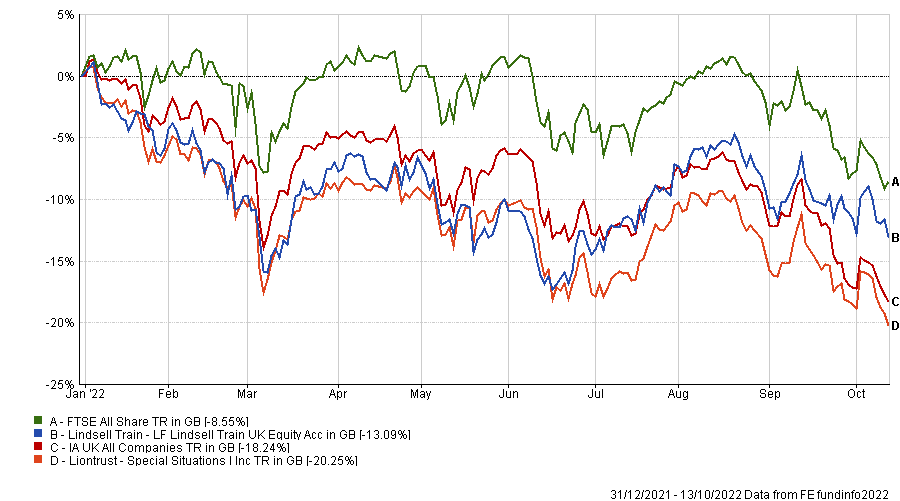LF Lindsell Train UK Equity and Liontrust Special Situations are among the standout performers in the IA UK All Companies sector over the past decade, but some fund pickers think one of the two has the edge in the current market.
The comparison between LF Lindsell Train UK Equity and Liontrust Special Situations “is an interesting one”, according to Tom Sparke, investment manager and director at GDIM. With a shared quality/growth bias, the two funds have multiple traits in common but can play different roles in a portfolio.
Looking at their performance over the long term, Bestinvest managing director Jason Hollands said the funds “have benefited from consistency in their management teams and use clearly articulated investment approaches,” which rewarded them with equally strong track records. Both are in the top decile of the IA UK All Companies over the past 10 years.
Although Liontrust Special Situations is ahead over three years, the tables have turned in the shorter term. LF Lindsell Train UK Equity is among the top five funds of the peer group over one, three and six months while the Liontrust portfolio has slipped into the second quartile.
In the year to date, LF Lindsell Train UK Equity has lost 13%. As the chart below shows, this is a worse showing than the FTSE All Share but the fund is ahead of the average IA UK All Companies member and the Liontrust fund by a decent margin.
Performance of funds year to date vs sector and index
Source: FE Analytics
Shared characteristics can be found at portfolio level too, but it is also here where Sparke and Hollands identified the two main differences that ultimately favoured one fund over the other.
The investment philosophies underpinning the funds are similar in that they both focus on businesses with durable earnings and avoid highly cyclical parts of the market, Hollands explained.
However, despite some overlapping stocks (both hold Diageo, RELX, Sage, and Unilever in their top 10 holdings), the Lindsell Train fund is more concentrated (typically holding 20-35 positions, which compares to 57 holdings in the Liontrust fund), holds a number of non-UK companies and has a strong bias towards consumer brands.
“Both approaches have worked well over the longer term but do have the potential to deliver very different performance versus the benchmark,” Hollands said.
Sparke too highlighted portfolio concentration as one key differentiator: “While Lindsell Train prefers larger, higher conviction holdings, with its top five holdings constituting nearly half the fund’s exposure, the Liontrust fund prefers top position sizes of 3-4%, which may sometimes lead to higher volatility”.
The second and perhaps more decisive difference is in the exposures to smaller companies.
Due to their size – both are running just under £4.7bn – the funds would struggle to hold significant positions in small-caps and have gravitated towards a large and mid-cap bias, said Sparke.
But, according to Hollands, Liontrust Special Situation has done so with less conviction, which cost it its position on the Bestinvest Best Funds list. LF Lindsell Train UK Equity, meanwhile, remains on the list.
“The main reason for this was that we feel the Special Situations fund is quite large in size now for a fund that has high weightings to smaller companies and so we preferred to swap it for the more modestly sized Liontrust UK Growth fund that is primarily invested in large and mid-caps stocks. Unsurprisingly the UK Growth fund has held up better this year than Special Situations, given a very tough period for small-caps.”
Hollands concluded that in the near term, the Lindsell Train UK Equity fund may prove more defensive in tough markets conditions, due to much lower exposure to small-caps and thanks to its cluster of non-UK stocks benefitting from high overseas earnings given the weak pound.
“That said, neither fund is heavily exposed to the UK domestic economy due to the businesses owned in each having very high overseas earnings,” he said.
Sparke would use these funds differently: “The Lindsell Train fund for punchy, ‘best ideas’ style exposure, useful if an investor has a smaller UK position, and the Liontrust as more of a core position in a diversified portfolio.”





